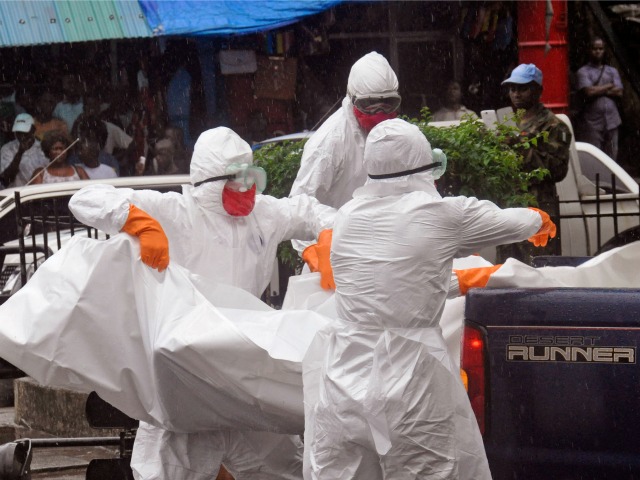
The executive director of the Association of American Physicians and Surgeons states that restricted entry to the United States will be necessary to stop the spread of the deadly Ebola virus.
“The potential for devastating loss of life is real,” wrote Dr. Jane M. Orient on the website of AAPS. “The disease must be stopped before there are millions of persons exposed instead of 100.”
Orient said that restricting entry to the United States means that travelers from areas affected by Ebola must be “carefully screened and quarantined when indicated.”
Additionally, she warned that to contain the spread of Ebola, the United States must observe a high degree of suspicion, including a “travel and exposure history” for patients with fever and other symptoms, precautionary isolation, and careful contact tracing so that at-risk individuals are “identified, notified, monitored, and isolated as needed.”
Orient said that hospital personnel must all be trained with adequate supplies of protective gear and have a high degree of alertness for signs of the deadly disease.
“We need hard-headed realism, not complacent reassurance,” Orient wrote.
“President Obama said: ‘It will require an air bridge to get health workers and medical supplies to areas that are affected,'” she noted. “Meanwhile, the virus has used the air bridge of a commercial flight to reach Dallas. So far, only the index patient is ill, but 100 contacts are being observed.”
Orient questioned how so many experts can say that the chance of a widespread outbreak is “vanishingly small” due to our “highly sophisticated public health system,” when the U.S. has already experienced a number of breaches in our stronghold, first and foremost the fact that the hospital treating the symptomatic patient from Liberia failed to follow federal guidelines. Rather than being placed in isolation, the patient was sent home with antibiotics which, Orient says, “are useless for viral infections.”
The patient then vomited outside his apartment before being returned to the hospital by ambulance, but no precautions were taken in cleaning up the vomit, and no special care was taken in transporting him in the ambulance, she said.
“Even now, the patient is being treated under BSL-2 (biosafety level 2) conditions, although the World Health Organization states that BSL-4 precautions are needed for working with Ebola virus,” Orient continued. “Rules requiring international passengers to fill out a detailed health questionnaire have not been implemented, although the CDC called them ‘critical to protecting Americans from dangerous diseases spread by travelers’–in 2006.”
Observing the inconsistency in reports from U.S. officials, Orient points out that while some are “frequently reassuring people that the virus is not ‘airborne'” and that “it is not possible, we are told, to get Ebola from a person who does not have symptoms,” CDC officials are meanwhile appearing in full hazmat gear, giving the impression that “a tiny pinprick through your glove, and you’ve got Ebola.”
“And how can one be sure that an asymptomatic patient cannot transmit disease?” she asks. “The virus is multiplying in his body–what is to prevent it from being shed before he notices fever or headache? It’s a matter of 1 degree. Corpses are teeming with virus, but it only takes a very few particles to infect someone.”
Though Orient understands the need to contain public panic, at the same time she believes absolute statements that later prove to be false will “destroy the credibility of the authorities.”
“We should be taking aggressive measures to stop this disease now,” Orient said, “instead of congratulating ourselves on our sophisticated system.”

COMMENTS
Please let us know if you're having issues with commenting.